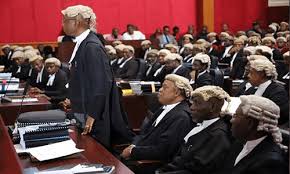Court Reserves Judgment on Kogi Governorship Election
By Roselyn James
At its Monday meeting in Abuja, the Kogi State Governorship Election Petition Tribunal postponed ruling on the appeal brought forth by the Social Democratic Party and its candidate for governorship election, Murtala Ajaka, challenging Usman Ododo’s election win. Ajaka’s attorney, Pius Akubo, asked the tribunal to reject the respondents’ submissions and accept Ajaka’s at today’s hearings.
As he begged the tribunal session to reject Ajaka’s plea, Kanu Agabi, the Independent National Electoral Commission’s attorney, informed the court that their final written address was dated and filed on May 2. In a similar vein, the tribunal was asked to reject Ajaka’s complete petition by the All Progressives Congress and Ododo on the grounds of incompetence and lack of merit.
In their final written addresses and arguments against the petitioners, the counsel for the respondents, Agabi, Joseph Daudu, and Emmanuel Ukala, implored the three-member panel of Justices, chaired by Justice Ado Birnin-Kudu, to dismiss the case.
Agabi argued that the Appeal Court had concluded that a petition should be struck down if its grounds are contradictory with one other and with the relief sought.
Additionally, he invoked a ruling from the Supreme Court in Tonye Cole’s appeal against INEC to support his claim that the petitioners’ evidence was egregiously inadequate. “We humbly submit that recent rulings from the Court of Appeal and Supreme Court simplify the work you must do in deciding this case.
It states that there is no evidence if the purported evidence is blatantly inadequate. Only 40 of the 305 witness depositions that the petitioner submitted were adopted in that particular case.
The decision states that the petitioner only accepted roughly 13.1% of the witness depositions. The depositions that were accepted in this instance only make up roughly 3.6% of the witness depositions, the speaker stated.
According to him, out of the specified scores, the petitioners only called 25 witnesses. According to Agabi’s mathematical analysis of the evidence, 3.6% of Ajaka’s witness deposition that was included in the petition amounted to a failure and should be rejected.
He said that in violation of the Supreme Court’s ruling in Obungado’s case, the petitioners also neglected to submit the witness deposition in advance. He contended that the witness for the petitioners, who discussed the Bimodal Voter Accreditation System devices, explicitly mentioned that he was unable to confirm if those were the actual BVAS machines.
Agabi additionally contended that the lack of the legally mandated certificate of trustworthiness accompanying the BVAS machine meant that it was tendered in violation of Section 84 of the Evidence Act.
“Moreover, the evidence found in the BVAS machines was insufficient to meet legal requirements,” he continued. Out of 25, he said that not a single election observer had been invited, and he dismissed the complaint as frivolous.
In addition, when the star witness was questioned, he was unable to differentiate between what he saw and heard. In his last written statement, dated May 1, Ododo’s attorney, Daudu, said that the petition was filed beyond the deadline and thus banned by statute.
The petitioner’s actions, he contended, were in violation of Evidence Act Sections 122(1) and (2)(a), which give the tribunal the authority to take judicial notice of the filing, serving, and reply dates.
Akubo disagreed to Daudu’s citation of the provision characterizing it as a new argument, even if he stressed that the petitioners replied to their service. Upon receiving word that Akubo was bringing up new matters, Daudu responded that he didn’t agree with him.
Read Also: FRC and NiMet to Collaborate on Sustainability
He said Akubo had the right to reply since his argument touched on remittal procedural matters, should the court find it persuasive. Additionally, he urged the tribunal to reject the forgery accusations made against his client, arguing that they touched on a pre-election issue that had already been resolved by the Supreme Court in Gbagi’s lawsuit against INEC.
Furthermore, according to Daudu, the petitioners’ citation of Section 137 of the Electoral Act in reference to their claims of excessive voting did not apply to the current petition.
Ukala, the APC’s representative, likewise adopted all the procedures but urged the court to reject SDP and Ajaka’s appeal for lack of substance. On April 30, he notified the court, their last written address had been filed on the same day.
According to Akubo, the petitioners’ attorney, the tribunal received their final written address on May 6 and it was not filed beyond the deadline. The petition was filed on December 2, 2023, he claimed, even according to a witness who worked for the respondents.
“We filed this petition within the time allowed by our law, and I implore your lordship to uphold that,” he declared. Judicial Birnin-Kudu withheld her decision in the petition after hearing arguments from all sides. The parties would be notified of the day of judgment, he declared. Note that after the parties concluded their legal proceedings in the case, the tribunal scheduled today, April 25, for the approval of final written addresses.
SDP and Ajaka had petitioned the tribunal to contest Ododo’s election victory in the Kogi governorship election on November 11, 2023. The petition lists INEC, Ododo, and the APC as the first, third, and first responders, respectively.

